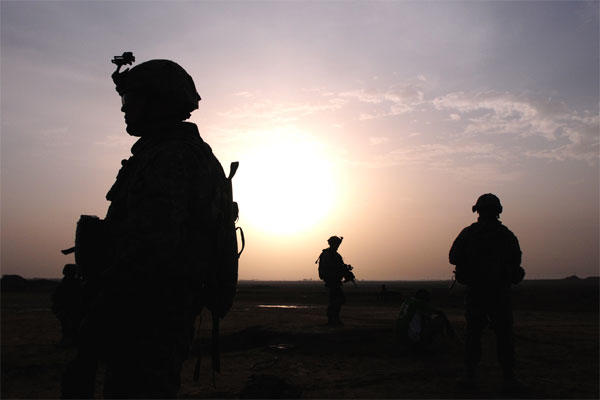The Defense Department and the services may -- or may not -- tell the public when U.S. troops have been wounded or injured in Iraq and Syria but will "typically" tell the families, unless the service member decides against it, Pentagon spokesmen said Thursday.
The issue of notifications on wounded and injured troops has been a main topic at Pentagon press briefings in recent weeks after the DoD took two different tacks on reports of wounded troops in Iraq and Syria, although Defense Secretary Ashton Carter insisted that the policy was consistent.
"We made no change in policy with respect to disclosing information about wounded service members, none whatsoever," Carter told Stars & Stripes on Wednesday.
However, Carter said there were a number of reasons why the department would withhold information, including the privacy rights of the service member.
"We do not disclose all features of battlefield wounds," Carter said. "There are a number of reasons for that. We don't disclose someone's personal injuries. That is a very private personal matter."
The Pentagon appeared to add to the criteria on notifications this week when Pentagon Press Secretary Peter Cook said that information on the wounded might also be withheld when it was deemed that disclosure would aid the enemy.
He was responding to a CNN report of a June 9 incident in Syria in which four U.S. troops reportedly were slightly wounded when a vehicle near their position was hit by an ISIS anti-tank round.
Cook refused to confirm or deny that troops had been wounded: "We provide information with regard, of course, to casualties, but for a variety of reasons, we do not provide information on wounded service members, and we're going to continue to stick to that, again, because we don't want to provide information to the enemy that might be helpful."
A lengthy back-and-forth with reporters ensued. "I'm glad you raised the question," Cook said, "because this does raise a question, a policy question, for us about identifying injured service members.
"And as I stated last week, and probably should have stated more clearly, our policy is not to identify wounded service members, for a variety of reasons -- including operational security, including privacy reasons."
"And so, I'm not going to be able to elaborate more fully on that situation. Just as I wouldn't with other wounded service members, because of that -- because of our policy in place," Cook said.
Late last month, the Pentagon routinely disclosed that two service members had been wounded or injured -- one in Iraq and one in Syria -- without any debate on notification policy.
On May 31, Navy Capt. Jeff Davis,the Pentagon's director of press operations, told reporters that two service members had been injured in the ISIS campaign by indirect fire. "They were not on the front lines," Davis said. "They were not engaged in active combat."
The Pentagon sought to clear up the confusion on notifications earlier this week with a statement: "The Department of Defense does not routinely release detailed information regarding service members who are wounded in action," although aggregate numbers on casualties will appear periodically on the DoD's website.
"This is due to concerns about operational security and about releasing health information that may be protected under HIPAA (Health Insurance Portability and Accountability Act)," which gives patients control over medical information that can be released.
HIPAA can come into play on notifications to families, a Pentagon spokesman said. Families are usually notified when a service member is wounded or injured, but the service member can also choose not to have his family notified, the spokesman said.
"That can happen when the service member does not wish cause anxiety for his family," the spokesman said.
The notification issue has been complicated by the long-standing debate over what is combat in Iraq and Syria. U.S. troops are limited to a train, advise and assist role, but Carter and President Obama have acknowledged that U.S. troops have occasionally been involved in combat.
According to the Pentagon, there have been three combat deaths among U.S. troops since the campaign against ISIS began in August 2014: Army Master Sgt. Joshua Wheeler, killed in a firefight in northern Iraq; Marine Staff Sgt. Louis Cardin, killed in a rocket attack in Iraq; and Special Warfare Operator 1st Class (SEAL) Charles Keating IV, who died in a firefight with ISIS forces in Tel Skuf, Iraq.
-- Richard Sisk can be reached at Richard.Sisk@Military.com.



























